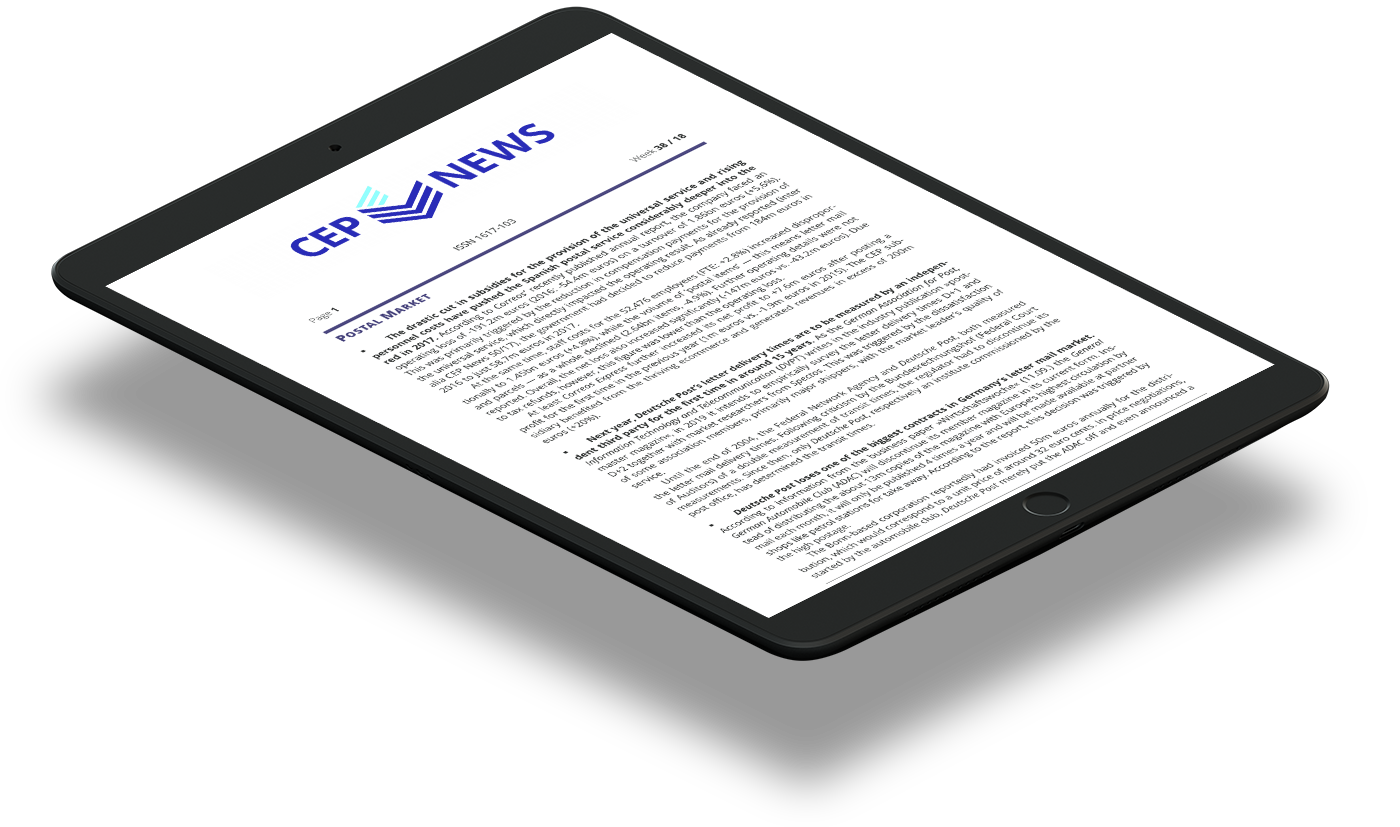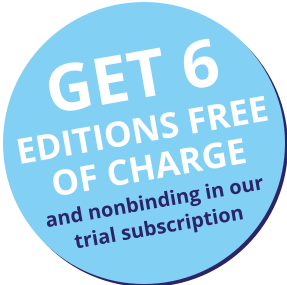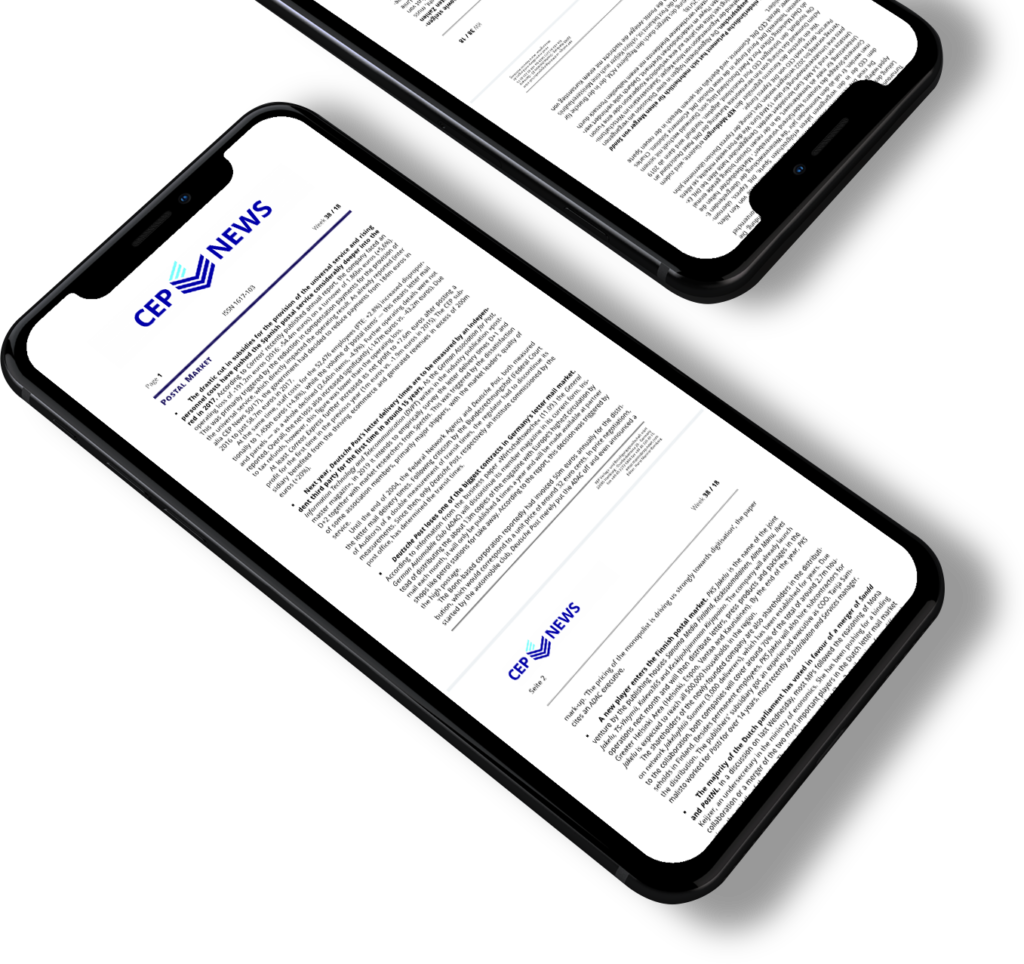Top news from the last three months:
Since 1995 hundreds of top executives, analysts and journalists from different industries from all over the globe have been using CEP News as one of their main source of information.
Each edition provides you with news, background stories and the respective context within the CEP market every week and remains true to these standards.
No advertising & critical
Just grab this opportunity for a free-of-charge nonbinding trial subscription!

„A really great newsletter, congratulations!“
„Without doubt, CEP News is one of the most important publications specialising in the European CEP market.“
„I’m sure this is the best industry service I‘ve seen and read so far.“
CEP News provide you with information about the latest trends and news in the postal, express and logistics markets from Germany, Europe and all over the world. Our weekly newsletter is published in German and English. Thus, CEP News is probably the sole bilingual news service in our industry.
The weekly edition makes sure that, besides bringing the latest news, we can also provide you with important background stories and the necessary context.
And even more important: Our broad view beyond the industry guarantees that our readers get information about the latest trends that can affect or even shape the industry in future
Top news

The second quarter of FY 2025/26 saw a further boom in revenues and losses at Indian delivery service Swiggy. With revenues coming to just under 544.9m euros (up 54 %), the company reported a net loss of around 107m euros (up 74 %) on Friday. The greater losses were due to the loss-making Q-com business Instamart (loss of 83.1m euros) and another sharp rise in advertising and sales promotion expenses. The shareholders letter is available here.
Group CEO Sriharsha Majety stated that 'Swiggy's food delivery business delivered another quarter of robust growth and improved profitability'. The company also announced that it aims to break even by the second quarter of 2026, 12 years after being incorporated! This goal is to be achieved by doubling revenues and without any major investments in new locations.
Swiggy intends to reinforce its liquidity position by raising fresh cash. This week, the Board of Directors wants to decide on a capital increase via a qualified institutional placement (QIP) totalling around 980m euros [sic!] Together with the proceeds from the sale of the stake in the ride-hailing platform Rapido - the equivalent of around 230.75m euros (CEP News 40/25) - this should be sufficient to cover the expected losses pending the break-even threshold.
Investors were not convinced; following the publication of the figures, the Swiggy share fell by more than 3 per cent, recovering only slightly by this week's editorial deadline. «EUR 1 = INR 102,147»
The carrier-agnostic parcel locker network Quadient has announced its launch in Italy. Described as a 'strategic milestone in European expansion', the market launch will take place under the Parcel Pending by Quadient brand. Details on possible locations and timetables have not been disclosed.
Quadient says it has 26,000 parcel lockers in use worldwide; the network is expected to grow to 40,000 installations by 2030. In this context, Quadient has also forged a partnership with UK parcel service Evri. Under the new agreement, Evri will activate 2,000 additional parcel lockers in the UK in the coming months.
The Swiss think tank Avenir Suisse is calling for a comprehensive reform of Swiss Post. According to the think tank's analysis published on Monday, Swiss Post needs a strategic realignment. Its current organisation as a logistics provider, digital service provider, bank and bus company is too complex.
Avenir Suisse is therefore proposing a five-point plan to politicians to stabilise and refocus the group: (1.) Political unbundling: In the future, the federal government should manage its stake in Swiss Post – together with other federal enterprises – via a professionally managed investment company within the Federal Finance Administration (FFA). (2.) Abolition of the remaining mail monopoly. (3.) Focus on core business: According to the think tank, Swiss Post is the world champion in the nationwide transport of mail and parcels. (4.) Limitation of digital expansion: In this regard, it is proposed that Swiss Post should confine itself to digital services that are closely linked to its core business. (5.) Spin-off of PostBus and PostFinance: Since there are hardly any synergies with Swiss Post's core business, Avenir Suisse says that the PostBus division should be spun off, either to be run independently or sold to an existing transport company. And this also applies to PostFinance. The Avenir Suisse report is available here.
Top News
The second quarter of FY 2025/26 saw a further boom in revenues and losses at Indian delivery service Swiggy. With revenues coming to just under 544.9m euros (up 54 %), the company reported a net loss of around 107m euros (up 74 %) on Friday. The greater losses were due to the loss-making Q-com business Instamart (loss of 83.1m euros) and another sharp rise in advertising and sales promotion expenses. The shareholders letter is available here.
Group CEO Sriharsha Majety stated that 'Swiggy's food delivery business delivered another quarter of robust growth and improved profitability'. The company also announced that it aims to break even by the second quarter of 2026, 12 years after being incorporated! This goal is to be achieved by doubling revenues and without any major investments in new locations.
Swiggy intends to reinforce its liquidity position by raising fresh cash. This week, the Board of Directors wants to decide on a capital increase via a qualified institutional placement (QIP) totalling around 980m euros [sic!] Together with the proceeds from the sale of the stake in the ride-hailing platform Rapido - the equivalent of around 230.75m euros (CEP News 40/25) - this should be sufficient to cover the expected losses pending the break-even threshold.
Investors were not convinced; following the publication of the figures, the Swiggy share fell by more than 3 per cent, recovering only slightly by this week's editorial deadline. «EUR 1 = INR 102,147»
The carrier-agnostic parcel locker network Quadient has announced its launch in Italy. Described as a 'strategic milestone in European expansion', the market launch will take place under the Parcel Pending by Quadient brand. Details on possible locations and timetables have not been disclosed.
Quadient says it has 26,000 parcel lockers in use worldwide; the network is expected to grow to 40,000 installations by 2030. In this context, Quadient has also forged a partnership with UK parcel service Evri. Under the new agreement, Evri will activate 2,000 additional parcel lockers in the UK in the coming months.
The Swiss think tank Avenir Suisse is calling for a comprehensive reform of Swiss Post. According to the think tank's analysis published on Monday, Swiss Post needs a strategic realignment. Its current organisation as a logistics provider, digital service provider, bank and bus company is too complex.
Avenir Suisse is therefore proposing a five-point plan to politicians to stabilise and refocus the group: (1.) Political unbundling: In the future, the federal government should manage its stake in Swiss Post – together with other federal enterprises – via a professionally managed investment company within the Federal Finance Administration (FFA). (2.) Abolition of the remaining mail monopoly. (3.) Focus on core business: According to the think tank, Swiss Post is the world champion in the nationwide transport of mail and parcels. (4.) Limitation of digital expansion: In this regard, it is proposed that Swiss Post should confine itself to digital services that are closely linked to its core business. (5.) Spin-off of PostBus and PostFinance: Since there are hardly any synergies with Swiss Post's core business, Avenir Suisse says that the PostBus division should be spun off, either to be run independently or sold to an existing transport company. And this also applies to PostFinance. The Avenir Suisse report is available here.

